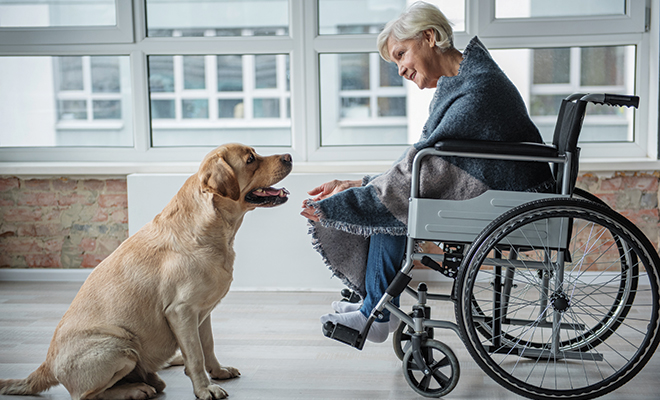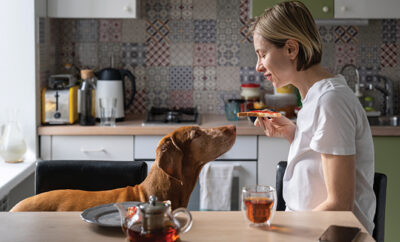
Pets: Bringing Comfort to COVID-Restricted Seniors
While the COVID-19 epidemic has been difficult for many people, it has been especially hard on those living in senior care facilities. Isolated from family and friends, often confined to their rooms, their loneliness can be overwhelming.
But some senior care facilities have found a way to help bring a little joy and companionship to those living there. The answer: visits from dogs and other pet animals bringing with them much-needed companionship.
Pet Partners is a nonprofit registering more than 10,000 dog handlers for animal-assisted therapy activities across the country, with teams making more than three million visits a year. Pet Partners’ teams help veterans with PTSD, people with intellectual disabilities and those living in senior residences or nursing homes. After hospitals, senior care facilities are the second most requested place for teams to visit.
Elisabeth Van Every, communications and outreach coordinator at Pet Partners, said they look for dogs with friendly personalities that are comfortable with new experiences. “We screen how they do around someone moving erratically, are comfortable with new experiences and are not negatively affected by unexpected noises. They need to be comfortable with being hugged. The handler has to guide their animal partner in a positive way.”
One program, Catholic Eldercare’s Pets with a Purpose in Minneapolis, Minnesota, chose to limit contact with volunteers bringing in their pets when cases of COVID-19 showed up last spring. But before the lockdown, volunteers with their pets would visit patients several times a week. These were mostly dogs but have included cats and a rabbit.
Kathy Bulicz, a breeder of Borzoi dogs, manages Pets with a Purpose. She was working at a veterinary clinic but got involved with animal visits when her mother became a resident. Bulicz said she begins by evaluating new animals to see how they react in various settings. “We’ll get a new volunteer, bring the pet into the lobby, walk them around to see how they react, including on the memory-care floor.
“There was a woman in memory care, sitting at a table with her head down. My dog Tally came under the table. She started to pet the dog and then started singing to her. Molly, the cat who visits the memory-care floor, climbs into bed and cozies with them.” People who might be agitated become calm, she said. Bulicz hopes to allow canine healthcare worker visits as soon as it is safe, again bringing joy to those who live there.
Elsewhere, other facilities have devised solutions to allow animal visits at senior care facilities. Some don’t require trained teams but look to their own staff members and their pets. The Hebrew Home at Riverdale in the Bronx, New York, created a pet therapy program 20 years ago, but when COVID-19 arrived in March 2020, no visitors were allowed. Instead, staff members took in their own dogs.
Catherine Farrell, director of therapeutic arts and enrichment programs and the Home’s primary dog handler, brings in Marley, her Great Dane. While she has to maintain a six-foot distance, there is no social distancing needed for Marley, who likes to snuggle. “Being around dogs can reduce blood pressure and anxiety and for many brings back memories. We maintain our distance, but the dogs can go right up and cuddle with the residents. It gives them experience of loving and being loved. Right now, dogs are one of the only ways for them to experience something incredibly needed, in an intimate way.
“We take him to see people who knew him before the pandemic,” Farrell said. “The staff and residents know Marley’s name better than mine. They were so excited to see him. Seeing this was one of the best moments of my life. I just welled up with tears. The dogs are not certified pet therapy dogs but they are assessed, must follow basic commands and not react to things like wheelchairs, elevators, medication carts and other things they might encounter.”
There are always new faces and new tails joining the program, she said. One new recruit is Kida, a rescue chocolate lab belonging to the home’s chief executive officer. Redwood, a puppy-in-training also comes for visits. “She has a lot of puppy energy,” said Farrell. And there’s Zeus, a fluffy Bichon Frisé. If they graduate, all three can join other staff-owned dogs for visits, bringing love into the lives at Hebrew Home.
“I can’t stress enough how important it is for someone to have a dog physically touch them,” Farrell said. “The only touch they get now is someone providing direct care. Marley can rest his head on the lap of someone in a wheelchair. He always lifts their spirits. Most residents want to pet the dogs. It gives them a connection.” ■
Sources: pennlive.com, petpartners.org and catholiceldercare.org.







